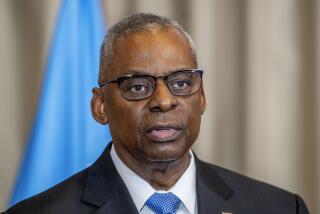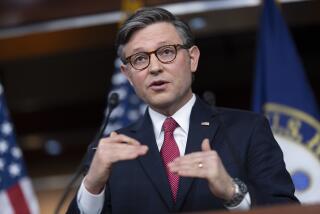GOP, Joint Chiefs Clash Over Spending
WASHINGTON — Republican senators Tuesday angrily accused the Joint Chiefs of Staff of overlooking a sharp erosion in military readiness because of a desire to support President Clinton’s goal of limiting defense spending.
In a sharp-edged confrontation, GOP members of the Senate Armed Services Committee charged that readiness had been falling long before the chiefs’ recently declared a need for substantial increases in the defense budget. Such increases would reverse 14 years of falling defense budgets.
“This readiness crisis didn’t come out of nowhere,” complained Sen. Robert C. Smith (R-N.H.) to the chiefs, who appeared before the committee. “You and your predecessors presided over it.”
“When you’re at the top of the chain of command, you have a responsibility to represent the soldiers and sailors and airmen that are beneath you,” said Sen. Rick Santorum (R-Pa.). “And, while the president of the United States is your commander in chief, when you come before this Congress . . . you have an obligation to represent the needs of those people.”
They will need up to $6.3 billion more than the $271 billion in authorized defense spending for fiscal 1999, which begins Thursday, the chiefs say. They also have asked for additional spending in the future, including as much as $20.3 billion more in fiscal 2000.
The chiefs have said that the additional money will be needed in future years to solve several problems, including falling recruitment, poor troop retention, aging weaponry and parts shortages.
The military’s request for added funds will put it in competition with other powerful constituencies for the more than $60 billion that has accumulated in the federal surplus. Democrats are pushing to use the money to bolster the Social Security system. The Republican leadership is pushing for big tax cuts as well as increased defense spending.
Clinton, in acknowledging the defense needs, has said he wants to add $1 billion in emergency funds for the coming year and to consider further increases in subsequent budget cycles.
But the chiefs’ change of heart has brought a wrathful reaction from Republicans, who have been seeking for years--with limited success--to make readiness a major issue of policy and campaign debates.
Sen. Dirk Kempthorne (R-Idaho) said that, in their testimony earlier this year, the chiefs had noted no serious problems with declining enlistments or pending cutbacks in military retirement programs--two issues that they now identify as major concerns.
The chiefs responded with forbearance. But at times it was clear that the encounter was trying their patience.
Gen. Michael Ryan, chief of staff of the Air Force, said he was concerned “at the implication that the gentlemen at this table aren’t being forthright and truthful.”
And Gen. Charles Krulak, the Marine commandant, insisted that he had always told the truth in congressional appearances, even at the risk of getting chewed out for it.
“My integrity--that’s all I’ve got,” declared Krulak, clearly injured. “Don’t take that from me.”
The chiefs said it had been difficult to quickly identify the readiness crunch because it had developed during the post-Cold War drawdown that continues to rapidly transform the services. Total active duty troop strength has fallen from a peak of 2.1 million in 1989 to 1.4 million today.
Amid such change, tracking trends in readiness was “difficult stuff,” said Gen. Dennis Reimer, the Army chief of staff.
The officers said that the most urgent need is to fix a declining military retirement system--which will be offering far less to younger service personnel--and to offset a growing gap between military and civilian pay. Declining compensation has been making it markedly harder to recruit and retain troops, officials said, especially with the recent strength of the civilian economy.
Correcting the pay gap would cost $35 billion over the next five years, while fixing the retirement system would add up to $9 billion more, officials estimated.
Separately Tuesday, Congress sent to Clinton a $250.5-billion defense spending bill for fiscal 1999 that would give military personnel a 3.6% pay raise and provide money for antimissile defenses. Total defense spending authorized for the year rises to $271 billion when funding tucked into other appropriations bills is included.
More to Read
Sign up for Essential California
The most important California stories and recommendations in your inbox every morning.
You may occasionally receive promotional content from the Los Angeles Times.











